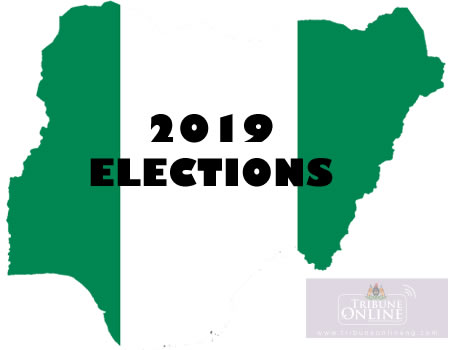
Expectations that the 2019 general election will herald a new democratic era might have been dashed. Last weekend’s governorship and state House of Assembly elections were plagued by the snatching of ballot boxes, maiming and killings, all leading to high voter apathy. Although some states recorded little or no violence, there was high level of brigandage in a number of flashpoint states like Rivers, Benue, Imo, Akwa Ibom, Oyo, Kaduna, Katsina and Sokoto. It is disconcerting that, in spite of the repeated reassurances of credible polling by the Federal Government, which deployed the police, the military and other security agencies, the elections still recorded high level of security breaches. The country has followed this sorry cycle since the advent of the Fourth Republic. It’s time to end the heist.
The bloodshed began two weeks ago during the first round of elections, which were for the presidential and National Assembly. A coalition of 70 civil society organisations said nearly 40 persons died then from electoral violence. Any expectations that the second round of elections last Saturday, involving 1,066 governorship candidates in 29 states and 14,583 assembly seats in 36 states, would be more peaceful were peremptorily dashed. Election observers reported that 58 people were killed altogether. This price is too high to pay for a basic civic duty.
Significantly, a federal lawmaker, Temitope Olatoye, was gunned down in Oyo State. Officials of the Independent National Electoral Commission were abducted or murdered in Katsina, Sokoto and Benue states. In Benue, thugs sacked collation centres, while vote buying was the order of the day across the country. It is still a far cry from the best practices elsewhere. Rivers State, which has gained notoriety for serious violence, suffered a similar fate again on Saturday. This led to the interference of the military and other security agencies. As a result, INEC suspended the polls. The legal disputes that are bound to follow will affect the quality of governance. The ordinary citizen is the worse for it.
Now that the country has been able to muddle through another bloody electoral path, President Muhammadu Buhari should summon the strong political will to implement the abandoned Muhammadu Uwais report. Rightly, the late President Umaru Yar’Adua admitted that the election that brought him to office in 2007 was flawed and vowed to engineer electoral reforms that would sanitise the process. In his inaugural address on May 29, 2007, Yar’Adua acknowledged the shortcomings in the country’s electoral process and promised to “set up a panel to examine the entire electoral process with a view to ensuring that we raise the quality and standard of our general elections and thereby deepening our democracy.” The 22-man panel chaired by a former Chief Justice of Nigeria, Uwais, among others, recommended the independence of the electoral body.
The report noted that the lack of independence of the electoral commissions at both the federal and state levels is a key deficiency of our electoral process and made appropriate recommendations to address the focal issues of their composition, administrative autonomy and funding. Specifically, the committee recommended the establishment of an agency different from INEC to prosecute all electoral offences and stiffer penalties, up to 10 years jail, for electoral fraud. In principle and probably in practice, this is a good reform. As Femi Falana, a human rights activist, has urged, the civil society should join forces and mount pressure on the Federal Government to implement the recommendations.
Time has come for a national assault on the pecuniary benefits attached to public office. The monstrous monthly allowance of N13.5 million for each senator, and the up to N6 billion security votes that some governors collect annually without being accounted for promote the carnage, violence and do-or-die mentality of our elections. Buhari should make a clear commitment to cutting the cost of governance, especially the obscene allowances our lawmakers award to themselves. The Appeal Court has ruled that “every public officer or servant who receives government or public funds as security votes or however described for security or other public purposes must use the money for the purpose, or render an account showing that it has been used for such purpose or return the money to the government treasury if it has not been used.” The anti-graft agencies should enforce the court ruling.
But there is also unquestionably the problem of impunity. INEC Chairman, Mamoud Yakubu, says, “The position of the commission is that all violators of the Electoral Act should be punished according to the provisions of the Electoral Act.” Globally, the democratic culture and the rule of law underpin the democratic process. The government and political actors have made enough mockery of elections in the country. Without enforcing the template of crime-and-punishment during elections, the present ugly order will continue to worsen in every election.
There is still a long way to go before the goal of ending electoral crime could be achieved. Some reports claim that more than 100 people were killed in election-related violence in 2003, 300 people in 2007, 800 in 2011 and 106 in 2015. In all of this, hardly were the perpetrators brought to justice. This explains why impunity has prevailed for such a long time. The acting Inspector-General of Police, Mohammed Adamu, should ensure that the law takes its course this time round.
Justice is about the victims too. The scores of victims of these elections who have been killed and others whose lives have been ruined deserve justice. The dysfunctional justice system should be reformed in line with Uwais report to handle election rigging cases expeditiously. Politicians must not think that they can commit atrocities with impunity. Bringing them to justice swiftly will demonstrate that they cannot.
END

Be the first to comment